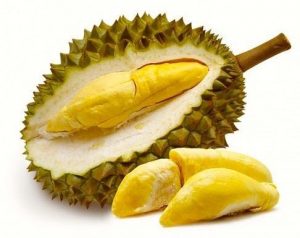Gospel durian. Somehow I don’t think that’s what Paul is meaning in describing us as the ‘fragrance of Christ’ in 2 Corinthians 2:15 but it might be closer to the ‘aroma of death’ he speaks of in verse 16. If you aren’t familiar with durian it is a large spiky skinned fruit common in Southeast Asia where it is known as “the King of Fruits”.  Rarely do you find anyone who is ambivalent about this fruit with it’s strong odor (many hotels or public transportation forbid bringing it with you) and acidic taste. You find many people who absolutely love the fruit and others who have an equally strong negative reaction.
Rarely do you find anyone who is ambivalent about this fruit with it’s strong odor (many hotels or public transportation forbid bringing it with you) and acidic taste. You find many people who absolutely love the fruit and others who have an equally strong negative reaction.
So what is McDonald’s thinking in offering durian milkshakes and even a durian McFlurry? It’s all about localizing the taste in their restaurants. A recent CNBC article asks the question of why McDonalds and Burger King have flopped in Viet Nam. (Note – those chains might not concede that they have flopped but their expansion has been much slower than desired.) CNBC’s conclusions and that of those commenting in the video centers around three main areas.
- The cost of western fast food is multiple times more than the cost of prevalent, tasty, inexpensive food from street vendors in Viet Nam, most of whom will hand your food over much faster than the ‘fast-food’ chains.
- The lack of a communal aspect to most western fast food is also cited as a barrier to growth for these chains. Viet Nam remains very much a collective society compared to the individualistic culture of the west. It’s difficult to set a Big Mac down in the middle of the table and share it among your group of friends.
- The taste of western fast food remains truly foreign to those accustomed to traditional Vietnamese dishes.
So perhaps McDonald’s feels part of the answer lies in continuing to increase their localized taste. They’ve added Banh Mi (traditional Vietnamese sandwich) to their menu as well as a variety of rice based meals. Their latest addition has been the durian milkshakes and McFlurry.
So what’s this have to do with reaching Viet Nam with the Gospel? It has some important parallels in how we localize, or contextualize the Gospel, discipleship, even the church in Viet Nam. God’s Word and the Truth of His Gospel doesn’t change but we must always be careful that in communicating it we don’t attach cultural trappings to that truth which may serve as a barrier to the advance of His Kingdom. Likewise, we must be ever vigilant to insure that we don’t water down the Truth of the Gospel in an attempt to make it more pleasing to our hearers.
The cost of the Gospel doesn’t change – following Christ requires everything of us. But the cost of doing church (meeting places, paid staff) may be impacted by our cultural preferences. While maintaining the important truth of the priesthood of the Believer and the individual standing before God – we must also recognize the cultural importance in Viet Nam of making decisions as a group, remembering Biblical testimony of families and groups that came to faith in Christ together. Pray with us for the broad multiplication of the Gospel, disciples and churches in Viet Nam that will come in a God-honoring, doctrinally sound and culturally sensitive way.


Leave a Reply